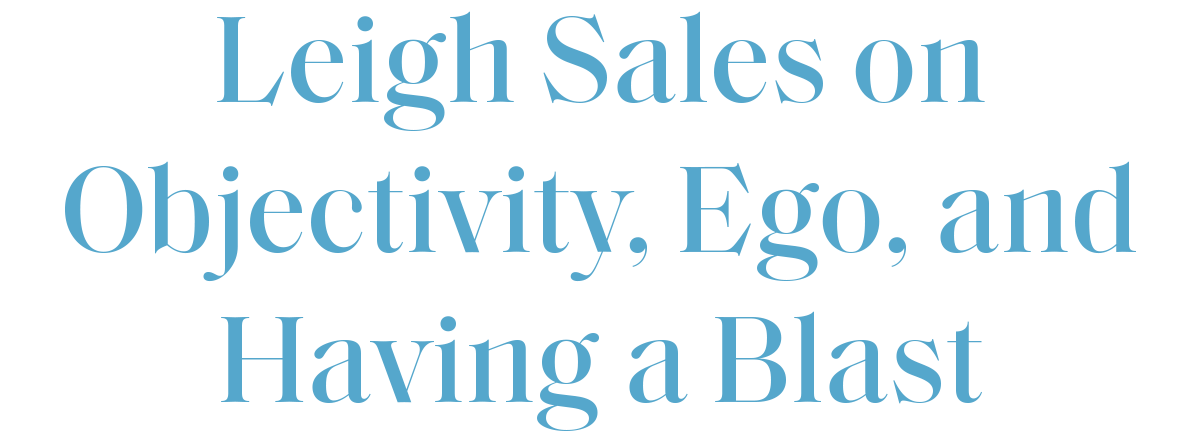Leigh Sales on Objectivity, Ego, and Having a Blast
A Q & A about her latest book, 'Storytellers'
News & Reviews Magazine
This article is part of our December edition. Read the editor’s letter to see what other fantastic writing has just been published. If you’re annoyed that it’s paywalled, then that means you wanted to read it, which means you value it. These writers get paid for what they do because their work is valuable. If you like that this type of independent media exists, please back it!
The piece you’re reading now is by News & Reviews founder and editor, Bri Lee. Bri writes a regular edition of News & Reviews every week. Subscribe to get it in your inbox Wednesdays at 5pm Sydney time.
As I’ve mentioned before, I really enjoyed Leigh Sales’ new book, Storytellers: Questions, Answers and the Craft of Journalism. It was my non-fiction pick for last month and Leigh was able to really generously answer some pretty detailed questions from me via email despite her intensely busy schedule. The book has an introduction by her and then goes into numerous interviews with all kinds of storytelling professionals.
In this book, she turns her interviewing skills onto her own profession, those usually asking the questions: the journalists. In ten sections—from News Reporting to Editing, via Investigative, Commentary and of course Interviewing—Sales takes us on a tour of the profession, letting the leaders in their field talk direct to us about how they get their leads, survive in war zones, write a profile, tell a story with pictures, and keep the show on the road.
I’ve split my questions here between those I had off the back of her introduction, and some things other people said in their interviews that I was dying to get her take on. Enjoy!
Questions from Sales’ introduction to the book
Bri Lee: Right up top in the introduction you share a lesson you learned from a mentor, and you write ‘almost everything worthwhile is learned on the job’. When I first finished high school I started a journalism degree but I was so appalled by what I saw from lecturers and tutors after a year that I switched to law. This was 2009 and we were being told that of the hundreds of us in the cohort, barely any would get jobs, and anyway the internet had ruined the industry because nobody would pay for the news, etcetera etcetera. [Basically, the nightmare scenario Samantha Maiden describes in her interview.] There is a tension these days that so many career paths and employment tracks that used to be on-the-job now in fact require degrees. And yet it seems to me that many types of journalism are best learned and taught on the job. How do you understand the pros and cons of the 21st century requiring young people to go through university before they start work in this industry?
Leigh Sales: I think a great university degree partly teaches content but should mostly teach you how to think. You should come out with the capacity for independent thought, an ability to know how to find things out for yourself and a love of learning. There's a lot of focus on diversity in journalism but I think part of it should be recruiting people who have not been to university. As well as cultural diversity, we need class diversity. If everyone went to capital city private or selective schools, and then uni, that’s not diversity. What about kids who can’t afford university? I would hire a switched-on 17 year old from Southport who’s hustling two part-time jobs and living out of home any day of the week over a 24 year old with a masters degree who still lives at home with mum and dad at Mosman. I would think the first person has a better chance of a being a good journalist.
BL: I was particularly struck by this par:
Though I am fascinated by new ways of thinking about and practicing journalism, I also unashamedly believe that regardless of evolving technology and values, the basics of the craft are unchanged and remain critical to effectively reporting on the world in which we live. Skills such as active listening, close observation, clear communication and sparse writing are always essential, whether you are filing for TikTok or Four Corners.
I understand and agree with the sentiment you’re expressing here, but I’d love to hear you speak further about what effect it’s having on the news that these social media companies are corporate giants with conflicted interests. It's not only that the technology is different now, but also that the platforms are so extremely compromised. There have always been commercial versus public broadcasters, but there is no widely used format or social media platform that puts truth above profits. What are the implications, then, for new and emerging practitioners having to juggle the desire a) to create high-quality news, with b) giving the algorithms and platforms what they want so that their good news work actually reaches an audience?
Keep reading with a 7-day free trial
Subscribe to News & Reviews by Bri Lee to keep reading this post and get 7 days of free access to the full post archives.







